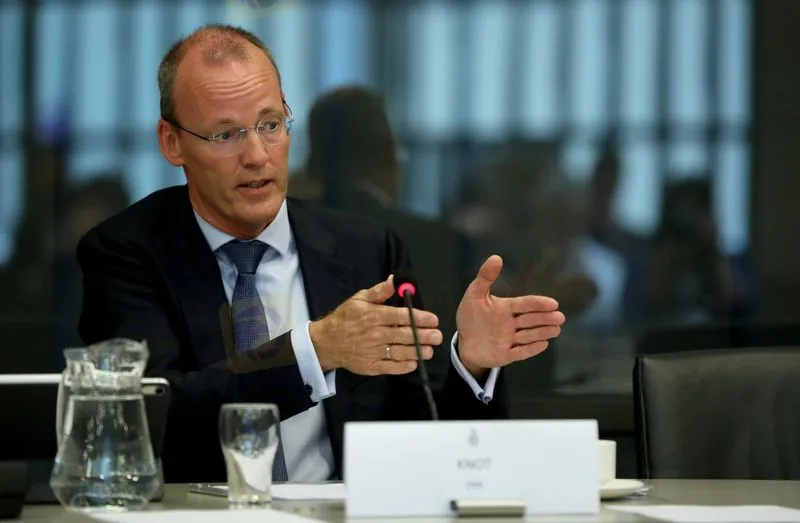简体中文
繁體中文
English
Pусский
日本語
ภาษาไทย
Tiếng Việt
Bahasa Indonesia
Español
हिन्दी
Filippiiniläinen
Français
Deutsch
Português
Türkçe
한국어
العربية
ECB sees first interest rate hike in fourth quarter of 2022
Abstract:Klaas Knot, the Dutch central bank president and a member of the European Central Bank's Governing Council, said on Sunday he expects the ECB to raise interest rates in the fourth quarter of this year.

Klaas Knot, the Dutch central bank president and a member of the European Central Bank's Governing Council, said on Sunday he expects the ECB to raise interest rates in the fourth quarter of this year.
In an interview on Dutch television programme Buitenhof, Knot, known as one of the more hawkish members of the ECB's board, said he supported winding down the euro zone central bank's asset purchasing programme as quickly as possible.
“Personally I expect our first rate increase to take place around the fourth quarter of this year.... Normally we would raise rates by a quarter percentage point, I have no reason to expect we would take a different step.” He added that he thought a second hike would likely follow in early 2023.
The bank must first end its asset purchasing programmes, currently set to be wound down in steps to 20 billion euros ($22.89 billion) per month by the fourth quarter. However, since Thursday bond markets have begun pricing in around 40 basis points of rate hikes by December.
“The first two rate increases will follow each other quite quickly, as they will take us out of negative territory,” Knot said.
“After that, if we don't see a wage-price spiral and inflation expectations remain anchored around our 2% target there is not much reason for us to increase rates significantly and quickly.”
Knot said that inflation in the euro zone, at 5.1% in January, was too high, and will probably last into 2023 before receding - assuming there is no further unexpected increase in energy prices.
For more blockchain news, please download WikiBit - the Global Blockchain Regulatory Inquiry APP.

Disclaimer:
The views in this article only represent the author's personal views, and do not constitute investment advice on this platform. This platform does not guarantee the accuracy, completeness and timeliness of the information in the article, and will not be liable for any loss caused by the use of or reliance on the information in the article.
Read more

Soft Inflation, Firm Yields: Fed Rate Cut Delayed to Year-End
The U.S. bond market initially rallied on cooling inflation but lost steam as Wall Street bet on later rate cuts. Fed policy expectations now lean toward a December easing, dampening gold and boosting equities.

When Tariffs Trigger Turmoil: 10 Past Trade Wars That Rearranged the World
Far from being mere policy tools, tariffs and trade restrictions have repeatedly served as catalysts for economic upheaval, diplomatic rifts, and even armed conflict. Here are ten historically significant trade wars that altered the course of nations and the global economy.

Are We in a Retracement Or the Start of a Financial Collapse?
As markets fluctuation in uncertain times and headlines grow darker, investors are left asking a crucial question: Is this a temporary downturn or something far worse? The terms bear market, recession, and depression are often thrown around interchangeably, but they represent very different levels of economic pain. Read this article to understand the differences between all three.

Why Fed Keeps Interest Rates Unchanged, How Does It Affect To Forex Market?
Fed keeps interest rates at 4.25%–4.50%, impacting forex market. Dollar may rise as tariffs loom. Explore why rates unchanged and forex effects.
WikiFX Broker
Latest News
How much money will you earn by investing in Vantage Broker?
IronFX vs Exness Review 2025: Comprehensive Broker Comparison
Fraudsters Are Targeting Interactive Brokers' Users with Lookalike Emails
Interactive Brokers: Global Office Visits and Licensing Details
Top Tips to Choose the Best Forex Broker in 2025
SEBI Notifies New F&O Rules for Investors - New Derivative Trading Limits & More Amendments
U.S. Jobs Data Released: A Potential Boost for Gold Prices
SkyLine Guide 2025 Malaysia: 100 Esteemed Judges Successfully Assembled
Everything you need to know about ADSS
Vantage Markets Review 2025: Trusted Forex and CFD Trading Since 2009
Currency Calculator


